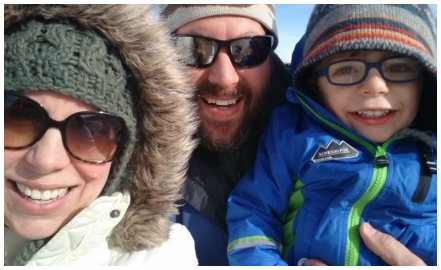Liz Wellberg, PhD, and Mike Rudolph, PhD
Ludeman Center Jul 1, 2017 You officially hold the record for being the first pair of Ludeman Center researcher spouses! How did you meet?
You officially hold the record for being the first pair of Ludeman Center researcher spouses! How did you meet? We met as graduate students. Liz was at Texas A&M and Mike was in the Molecular Biology program at CU Anschutz. Mike was part of the Mammary Gland Program Project Grant run by Dr. Peggy Neville, and Liz came to the annual retreat with her PhD mentor one year. We began collaborating in our graduate work, and life outside the lab developed after that.
What is it like to live in a home with two researchers?
Life with two junior faculty researchers is challenging, but also exciting. Because we interact with researchers within the same discipline, our science does not follow the typical work week, and often our work spills over into our home life. We actively try to make family time free from work-related stressors, but sometimes we aren’t great at that. In fact, our four-year-old son has been known to walk around the house with a piece of paper declaring that he’s “working on his grant!”
How do you help and support each other?
Mike’s strengths are in understanding and a focusing on experimental and methodological details, while Liz is better at understanding how details fit into the bigger picture and the long-term implications of a project. These skills complement each other well, and both are necessary for a successful research career. In terms of support, we give and take as much as possible. On the professional side, we work to help each other with grants and papers. On the personal side, when one of us has a professional deadline or additional obligation, the other tries to pull more weight at home.
Finding a work-life balance is not easy, but Judy Regensteiner and the other leaders at the Ludeman Center have been a huge support to both of us. Interactions with this group have taught us about ways to achieve the seemingly disconnected goals of building a healthy family life and a successful scientific career. Unfortunately, many programs offered to junior faculty scientists overlook this, but we have had the benefit of being Ludeman Center-funded researchers, so we feel extremely lucky!
Tags:
CWHR Researcher Spotlight